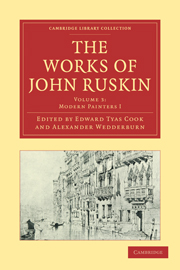Book contents
- Frontmatter
- Contents
- LIST OF ILLUSTRATIONS
- INTRODUCTION TO THIS VOLUME
- BIBLIOGRAPHICAL NOTE
- MODERN PAINTERS VOLUME I
- AUTHOR'S PREFACE TO FIRST EDITION (1843)
- AUTHOR'S PREFACE TO SECOND EDITION (1844)
- AUTHOR'S PREFACE TO THIRD EDITION (1846)
- AUTHOR'S PREFACE TO NEW EDITION (1873)
- AUTHOR'S SYNOPSIS OF CONTENTS
- PART I OF GENERAL PRINCIPLES
- SECTION I OF THE NATURE OF THE IDEAS CONVEYABLE BY ART
- SECTION II OF POWER
- CHAPTER I GENERAL PRINCIPLES RESPECTING IDEAS OF POWER
- CHAPTER II OF IDEAS OF POWER, AS THEY ARE DEPENDENT UPON EXECUTION
- CHAPTER III OF THE SUBLIME
- PART II OF TRUTH
- SECTION I GENERAL PRINCIPLES RESPECTING IDEAS OF TRUTH
- SECTION II OF GENERAL TRUTHS
- SECTION III OF TRUTH OF SKIES
- SECTION IV OF TRUTH OF EARTH
- SECTION V OF TRUTH OF WATER
- SECTION VI OF TRUTH OF VEGETATION.—CONCLUSION
- Appendix
- Plate section
CHAPTER I - GENERAL PRINCIPLES RESPECTING IDEAS OF POWER
Published online by Cambridge University Press: 07 September 2011
- Frontmatter
- Contents
- LIST OF ILLUSTRATIONS
- INTRODUCTION TO THIS VOLUME
- BIBLIOGRAPHICAL NOTE
- MODERN PAINTERS VOLUME I
- AUTHOR'S PREFACE TO FIRST EDITION (1843)
- AUTHOR'S PREFACE TO SECOND EDITION (1844)
- AUTHOR'S PREFACE TO THIRD EDITION (1846)
- AUTHOR'S PREFACE TO NEW EDITION (1873)
- AUTHOR'S SYNOPSIS OF CONTENTS
- PART I OF GENERAL PRINCIPLES
- SECTION I OF THE NATURE OF THE IDEAS CONVEYABLE BY ART
- SECTION II OF POWER
- CHAPTER I GENERAL PRINCIPLES RESPECTING IDEAS OF POWER
- CHAPTER II OF IDEAS OF POWER, AS THEY ARE DEPENDENT UPON EXECUTION
- CHAPTER III OF THE SUBLIME
- PART II OF TRUTH
- SECTION I GENERAL PRINCIPLES RESPECTING IDEAS OF TRUTH
- SECTION II OF GENERAL TRUTHS
- SECTION III OF TRUTH OF SKIES
- SECTION IV OF TRUTH OF EARTH
- SECTION V OF TRUTH OF WATER
- SECTION VI OF TRUTH OF VEGETATION.—CONCLUSION
- Appendix
- Plate section
Summary
No necessity for detailed study of ideas of imitation
We have seen in the last section what classes of ideas may be conveyed by art, and we have been able so far to appreciate their relative worth as to see, that from the list, as it is to be applied to the purposes of legitimate criticism, we may at once throw out the ideas of imitation: first, because, as we have shown, they are unworthy the pursuit of the artist; and, secondly, because they are nothing more than the result of a particular association of ideas of truth. In examining the truth of art, therefore, we shall be compelled to take notice of those particular truths whose association gives rise to the ideas of imitation. We shall then see more clearly the meanness of those truths, and we shall find ourselves able to use them as tests of vice in art, saying of a picture,—“It deceives, therefore it must be bad.”
Nor for separate study of ideas of power.
Ideas of power, in the same way, cannot be completely viewed as a separate class; not because they are mean or unimportant, but because they are almost always associated with, or dependent upon, some of the higher ideas of truth, beauty, or relation, rendered with decision or velocity. That power which delights us in the chalk sketch of a great painter is not like that of the writing-master, mere dexterity of hand.
- Type
- Chapter
- Information
- The Works of John Ruskin , pp. 116 - 121Publisher: Cambridge University PressPrint publication year: 2010First published in: 1903



